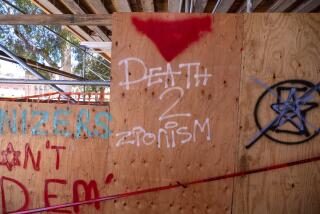Israel and South Africa
- Share via
In equating Israel and South Africa as racist societies (Editorial Pages, Aug. 20), Mark Bruzonsky is right in only one respect: “Analogies,” he states, “are always imperfect analytical tools.” His own analysis demonstrates that facile analogies may not only be “imperfect” but pernicious as well. Indeed, the quest for such analogies discloses more about the world view of the author than about the reality of that which he describes.
For anyone familiar with the reality of modern Israel, the charge of racism is patently absurd. The Arab citizens of Israel enjoy the full plenitude of Israeli rights of citizenship. They participate actively in the political process. They elect Arabs to the Knesset. They actively participate in the political party process. They are members of the Histradut and the wage scales applicable to Arabs are the same as to other citizens of Israel. They publish journals and newspapers with complete freedom of expression, in the same fashion as is accorded other media in Israel. They attend public schools, including universities, in increasing numbers.
Arabs in the West Bank and Gaza are of course not citizens of Israel. Those areas comprise severe security problems for Israel. Nevertheless, there has never been an occupation in which the level of well-being of the occupants and the relative availability of free expression has matched that prevailing in the West Bank and Gaza.
Newspapers are published in the occupied areas, all openly critical of Israel. Four universities exist in that area, as well as teacher-training academies and numerous secondary level institutions of higher learning. These institutions have been created subsequent to the Six Day War.
The level of economic and social well-being for Arabs in these areas exceeds that in any Arab country. Indeed, there is greater intellectual freedom accorded everyone in those areas than is the case anywhere else in the Middle East. To be sure, an occupation is never an ideal condition. To equate security measures taken by a state under such circumstances with racism is to turn reality on its head.
It is of course true that the continuing failure of the Arab states other than Egypt to accept the legitimacy of the existence of the State of Israel has left the conditions in the West Bank in limbo, and has generated within Israel in some portions of its population attitudes toward Arabs and toward the future of the West Bank that many of us do not embrace. But there again, the assertion of racism tortures the English language.
The author suggests that the “racist” character of Israel is confirmed by the dealings of Israel with the Union of South Africa in commerce and trade. That, too, is a tortured distortion of reality. Israel’s imports from South Africa, as well as its exports to South Africa, are an infinitesimal part of South Africa’s foreign trade. It pales in significance when compared with the level of trade maintained by South Africa with the other countries of black Africa, as well as other countries in the world, including the Soviet bloc. If such comparisons are appropriate to determine racism, the author surely should have included the rest of black Africa, as well as most of the other countries of the world, in his charge of racism.
More significantly, it is grotesque to charge Israel with racism in the light of its own clear and inspiring record of development aid programs for 31 black African countries in all fields of agriculture, regional planning, water management, soil conservation, afforestation, cooperatives, community development, education and health. The absorption of Ethiopian Jewry into Israeli society, which is now proceeding apace, further belies the charge of racism.
What fails to come through in Bruzonsky’s analysis is the recognition of the reality that Israel is truly a free society that has absorbed the most diverse of peoples in its own polity and society. To judge Israel by standards impossible of achievement by any is to reveal one’s own commitment to the erosion, weakening and destruction of the few free societies left in the world. I fear that such is, in fact, the operating ethos embraced by the author.
HOWARD I. FRIEDMAN
Los Angeles
Friedman is president of the American Jewish Committee.
More to Read
Sign up for Essential California
The most important California stories and recommendations in your inbox every morning.
You may occasionally receive promotional content from the Los Angeles Times.












